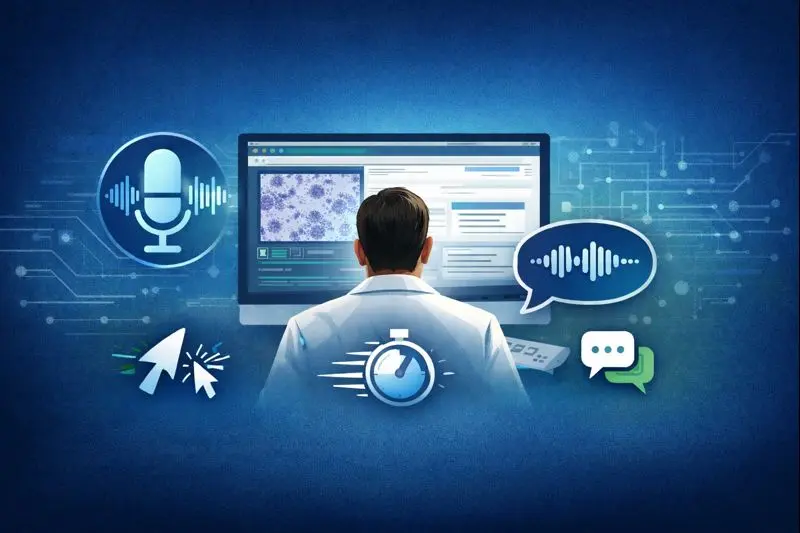Blog
Pathology Lab Reporting Software: Enhancing Laboratory Efficiency
June 18, 2025
A silent revolution is underway in laboratory healthcare, powered by pathology lab reporting software.
Pathology lab reporting software isn't just another piece of tech - it's reshaping the very fabric of how clinical labs and pathology practices operate while ensuring precision, efficiency, and unparalleled patient care.
Join us as we unravel the magic behind pathology lab software and its transformative role in modern laboratories.
Your journey into the future of medical science begins here.
Learn More: Best Pathology Lab Reporting Software - Buyers Guide and Checklist
Why Pathology Lab Reporting Software is Essential
In the intricate world of medical laboratories, the stakes are high. These labs are at the forefront of patient care, juggling tasks ranging from intricate sample tracking and processing to meticulous data management.
Here's a deep dive into why pathology lab reporting software is not just beneficial but essential for modern clinical laboratory management:
- The Complexity of Lab Operations: Medical labs are more than test tubes and microscopes. They handle complex bioinformatics, genetic data, and patient histories. Managing such diverse and intricate data manually and at scale without advanced pathology lab reporting software is virtually impossible.
- Human Error and Patient Safety: While traditional manual operations have their merits, they are inherently susceptible to human errors. A single mislabeled sample or data entry error can have serious repercussions, potentially compromising patient safety, treatment outcomes, and laboratory compliance.
- Efficiency and Productivity: Time is of the essence in medical labs. Delays in processing or data retrieval can impact diagnosis and treatment. Pathology lab reporting software creates automated labs that rely much less on manual workarounds, ensuring timely and accurate results.
- Consistency in Operations: Consistency is key in medical tests and analyses. Pathology lab report software ensures that every procedure, from sample collection to result delivery, follows a standardized protocol, ensuring reliability.
- Adapting to Modern Healthcare: Healthcare is becoming more data-driven and interconnected. Pathology lab report software integrates seamlessly with other diagnostic lab software systems, ensuring smooth data flow and end-to-end data integrity.
Learn More: Leveraging LigoLab for Optimal Return on Investment - An LIS Systems Guide for Lab Directors

Understanding the Different Types of Pathology Lab Reporting Software
Navigating pathology lab reporting software can be intricate, given the range of options available. To make an informed decision, it's crucial to understand the nuances and specialties of each type.
Here's a comprehensive breakdown:
Laboratory Information Systems (LIS Systems):
- Core Focus: Laboratory information systems (medical LIS) are designed primarily to manage patient-centric data. This includes test results, patient histories, and diagnostic information.
- Integration with Healthcare Systems: LIS systems are often integrated with hospital management systems or electronic health record (EHR) systems to ensure seamless patient data flow across the healthcare continuum.
- User Base: Laboratory information systems are predominantly used in clinical diagnostic labs where patient diagnosis and treatment are the primary goals.
- Data Security and Compliance: Given its patient-centric nature, LIS systems have robust security features, ensuring patient data confidentiality and compliance with healthcare regulations.
White Paper: Vendor to Partner - How Aligning with Your LIS System Provider Can Transform Your Lab
Laboratory Information Management System Software (Lab LIMS):
- Core Focus: A laboratory information management system (lab LIMS) is tailored to manage samples in batches. It tracks the journey of a sample, from collection to testing and storage.
- Operational Efficiency: Like LIS systems, a lab LIMS automates many processes, such as sample registration, result entry, and report generation, enhancing lab productivity.
- Versatility: While a laboratory information management system is commonly associated with clinical laboratories, its applications span various other sectors, including research, agriculture, and environmental testing laboratories.
- Inventory Management: Like advanced LIS systems, a laboratory information management system often includes features for managing reagents, chemicals, and equipment, ensuring optimal lab resource utilization.
A Note on Terminology: While medical LIS systems and LIMS lab management software systems are both defined as pathology lab reporting software with distinct functionalities, it's not uncommon for these terms to be used interchangeably in the industry.
This overlap (LIS vs LIMS) is largely due to the evolution of laboratory information system software, as many modern pathology reporting platforms now incorporate features from both. That said, when selecting pathology software, it’s more important to evaluate the system based on your lab’s specific needs and capabilities rather than getting caught up in labels or terminology.
Key Features of Pathology Lab Reporting Software
Advanced pathology lab report software is vital to modern clinical laboratory management; it's an integral team member, lab manager, and administrator.
Here's what advanced pathology lab reporting software brings to the table:
Automated Clinical Lab Workflow and Sample Tracking
- Efficiency Boost: Automated pathology lab reporting software accelerates numerous lab processes, from sample registration to result dissemination, reducing turnaround times.
- Instrument Integration: Pathology lab reporting software interfaces directly with lab instruments, automating data capture and reducing manual data entry.
- Error Reduction: Automated labs enjoy a lab workflow that significantly diminishes the risk of human errors, ensuring that results are timely, consistent, and reliable.
- Task Scheduling: Many pathology software platforms offer task scheduling features, ensuring no critical activity is overlooked and resources are utilized optimally.
Learn More: Transforming Patient Care - The Power of Laboratory Information Systems (LIS Software) in Healthcare
Laboratory Information Systems and Data Management
- Centralized Repository: LIS systems and laboratory information management system software serve as centralized hubs for all laboratory data, ranging from patient information to test results, enabling quick access, streamlined report generation, and efficient data sharing.
- Data Integrity: With features like comprehensive audit trails and automated sample tracking, LIS systems and lab LIMS ensure data integrity throughout the lifecycle of all specimens.
- Advanced Search: Modern laboratory information systems and LIMS lab management platforms feature powerful filtering and search functionalities, enabling users to retrieve specific data sets and results with ease.
- Backup and Recovery: LIS vendors and LIMS providers recognize the critical importance of data, which is why both types of systems include built-in backup solutions to safeguard information and ensure quick recovery in the event of unexpected disruptions.
Learn More: LigoLab’s Enhanced Cybersecurity Solutions Give Customers Added Protection and Peace of Mind
Regulatory Compliance
- Adherence to Standards: LIS systems and laboratory information management software applications are both designed with built-in features to ensure labs adhere to local, national, and international quality standards.
- Automated Reporting: Many regulatory bodies require periodic reports. LIS systems and laboratory information management system software can largely automate this, generating standardized reports at scheduled intervals.
- Audit Readiness: With features that require compliance verification throughout clinical lab workflow, LIS systems and LIMS lab management software ensure labs are always prepared for inspections or audits.
- Security Protocols: Given the sensitive nature of lab data, laboratory information systems and lab LIMS are equipped with strong security measures—including access controls and data encryption—to ensure confidentiality and protect against unauthorized access.
Learn More: Supporting Innovation - How LigoLab Empowers Labs to Develop and Validate Their LDTs

Benefits of Implementing Pathology Lab Reporting Software
Every laboratory has unique needs, and the best pathology lab reporting software is one that can be tailored to meet these requirements.
While we've discussed the essentiality of pathology lab report software in a modern healthcare context, it's equally crucial to understand the tangible benefits.
Let's explore the multifaceted benefits of integrating pathology lab reporting software into a modern lab environment:
1. Tailored Sample Tracking Management
- Customized Workflows: Recognizing that every sample type has unique requirements, pathology lab reporting software enables labs to customize workflows, ensuring each sample is treated appropriately.
- Traceability: From collection to disposal, pathology lab reporting software tracks the entire lifecycle of a sample, providing a transparent and auditable trail of activity.
- Quality Assurance: Pathology lab reporting software ensures accurate testing, reliable results, and precise reporting.
Learn More: How Pathology Specimen Tracking System Software is Reducing Lab Errors & Enhancing Patient Safety
2. Holistic Instrument & Inventory Management:
- Real-Time Monitoring: Pathology lab reporting software provides live updates on instrument status, usage, and calibration schedules.
- Inventory Optimization: By tracking reagent levels and equipment usage, advanced pathology lab reporting software helps labs minimize waste and optimize procurement cycles.
- Maintenance Alerts: Proactive notifications supported by pathology lab report software ensure that equipment is serviced regularly, reducing downtime and ensuring consistent performance.
3. Dynamic Clinical Laboratory Management
- Role-Based Access: Pathology lab reporting software defines roles, ensuring that staff can only access data and tools relevant to their responsibilities.
- Collaborative Tools: Integrated communication tools facilitate better teamwork and faster decision-making.
- Training Modules: Most pathology lab reporting software platforms offer integrated training modules, ensuring staff are always updated on the latest procedures and best practices.
4. Comprehensive Data Reporting & Analysis
- Custom Reports: Advanced pathology lab reporting software platforms are often referred to as such because they offer customized report templates that can satisfy client preferences and support multiple types of distribution. Going beyond standard reports, labs can generate various custom reports tailored to the needs of even the most complex laboratories.
Learn More: Streamline Laboratory Workflow Management With Customized Lab Reports & Unmatched Client Support
5. Robust Data Storage & Security
- Encryption: Pathology lab reporting software ensures that data, both in transit and at rest, is encrypted, safeguarding against unauthorized access.
- Disaster Recovery: With cloud-based backups, labs can quickly recover data in the event of hardware failures or other disruptions.
6. End-to-End Laboratory Billing Solutions
- Automated Coding and Invoicing: Advanced pathology lab reporting software that supports laboratory billing (lab revenue cycle management) can generate invoices based on automated ICD and CPT coding functionality soon after the test order arrives, reducing administrative overhead and potential revenue leakage.
- Insurance Integration: When integrating with third-party lab billing services, pathology lab reporting software can automatically verify coverage and eligibility while submitting claims, reducing denials and streamlining the payment process.
While the essentiality of pathology lab reporting software underscores its foundational importance in a lab's operations, its benefits include a transformative impact on a lab's efficiency, accuracy, and overall service quality.
.webp)
Pathology Lab Reporting Software: Final Thoughts
Pathology lab reporting software is pivotal in today's medical laboratory landscape. It's more than just a digital tool; it's a driving force that elevates every aspect of lab operations.
From meticulous sample tracking and handling to streamlined and highly automated laboratory revenue cycle management processes, the impact of pathology lab software is truly profound. Whether tailored for specific needs or designed for broader laboratory functions, this pathology software remains an indispensable and invaluable cornerstone for any lab aiming for excellence and efficiency.
Ready to experience excellence? Discover the transformative power of LigoLab’s pathology lab reporting software firsthand.
Book a demo today and propel your laboratory operations to new heights.
.jpg)






